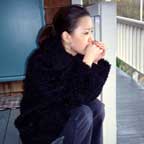
After reading the following scenarios, close your eyes and imagine being in these women’s shoes.
You’ve just entered the front door of your home with suitcase in hand, and your husband is unloading the remaining luggage from the car following a romantic anniversary vacation. The telephone rings. You anticipate it being your in-laws to welcome you both home and arrange a time to pick up your toddler. Instead of the familiar voice of your in-laws, a woman asks about your vacation and, by the way, she and your husband have been having an affair—and she’s pregnant. Now imagine confronting your husband; he denies it, and for months convinces you it’s all a mistake and you’re overreacting. You then discover quite accidentally that he’s been advertising himself and your toddler, via a photo on the Internet, as a widower in search of female companionship and, in fact, has contacted numerous women online and some in person.
Another scene: it’s a major holiday, and your adult children and their children are visiting your home. You’re in the kitchen preparing a meal; your husband is upstairs changing clothes. The doorbell rings, and your son answers it. He calls you to the foyer, and you’re both greeted by authorities looking for your husband. He comes to the foyer, is arrested, and led off for computer porn “of some sort.”
Or, you and your husband are missionaries and, along with your children, have been living in another country for 13 years. The local authorities bring to the attention of your governing church that your husband has been sexually involved with numerous young males throughout several villages. Your family is sent back to your state of origin; your husband is stripped of any church function and is without a job.
The above scenarios are real stories of real women experiencing the devastation of their husband’s sexual addiction. Typically, wives of sexual addicts also discover a co-occurring problem such as extreme debt from a secret credit card, Obsessive Compulsive Disorder, ADD/ADHD, gambling, or alcohol/drug addiction.
The impact of a husband’s sexual addiction on his wife is unlike the effects of any other addiction. As wives cry in anguish out of their fear, hurt, confusion, and sometimes physical pain due to contracting a sexually transmitted disease, it’s easy to see the trauma expressed psychologically, emotionally, and spiritually. Many wives report knowing their husband had looked at “girlie” magazines, viewed soft porn on video or the Internet, or went to strip clubs prior to their marriage. These women and their husbands typically use the rationale that “it’s just a guy thing,” and they believe it’ll change once they’re married.
With sexual addiction, however, sincere promises to discontinue the hurtful, dangerous, and sometimes illegal sexual behavior aren’t sufficient to restore a marriage. Professional assistance by a therapist who’s trained and specializes in addictions is necessary for both the husband and the wife. Often, members of the clergy, wanting to help their flock, inadvertently wound wives by offering suggestions that ultimately damage what esteem, confidence, and value they’re struggling to keep.
Following the disclosure of a husband’s secret life, these are common questions asked by wives in the safety of a therapist’s office:
• How could I have been so stupid?
• How can he say he loves me?
• Should I become a blonde/brunette/redhead?
• Would it help if I wore a smaller dress size?
• Should I watch porn with him?
• Should I buy different lingerie?
• Is this really an addiction, or is he just stuck in adolescence?
• Do I need an attorney?
• Should I file for separation/divorce?
• Can we ever have a “normal” marriage?
• Might he molest our children?
• Can I demand that he seek professional help?
Every concern is dealt with in the office of a trained addiction therapist. Once the wife of a sexual addict has become aware of his double life, the tendency for her is to withdraw, isolate, and live in her own world of anger, fear, shame, guilt, anxiety, and hopelessness. Throughout the therapy process, she’ll learn she didn’t cause this, she can’t cure him, and she can’t control this addiction. Through bibliotherapy; watching educational videos; becoming familiar with local support groups; getting her children in for therapy; and sharing her thoughts, fears, and practical concerns, she’ll discover there can be a healthy, joyous, and peaceful life for herself and her family—whether or not her husband decides to seek his own professional help and recovery. TPW
